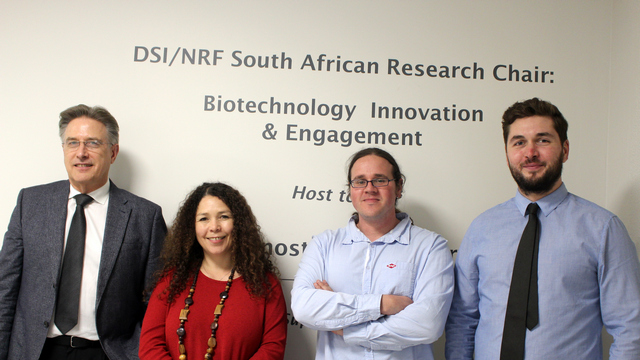
By Julian A Jacobs, PhD candidate, School of Journalism and Media Studies
Early detection methods of childhood-impacting diseases are generally either unavailable, unreliable or too expensive in developing countries. A partnership between Rhodes University’s Biotechnology Innovation Centre (RUBIC) and the United Nations Children’s Fund (UNICEF) Global Innovation Centre (GIC), will see these challenges being addressed.
RUBIC has developed a suite of proven technological advancements in diagnostics testing that can increase life expectancy and the quality of life for children. The collaboration seizes one of the biggest public health opportunities of our time: the ability to test for, and thus treat, life-threatening diseases such as HIV and malaria soon after the point of infection in communities without means or infrastructure to do so.
This work is essential to ensure the health and wellbeing of children in low-resource communities devoid of affordable or accessible medical services and facilities.
Speaking at the launch of the new Diagnostic lab, Dr Peter Clayton, Deputy Vice-Chancellor of Research and Innovation at Rhodes University, said it was a joyous occasion to celebrate the opening of the new labs. “These diagnostics tests, which literally intend to save thousands of vulnerable children and vulnerable women in the child-bearing context, is something we can be proud of,” he said.
He thanked the RUBIC team, who worked hard on this project despite experiencing dramatic infrastructure renovations over the last year. “It’s quite a statement about their resilience that they have managed to achieve this goal regardless. We are proud of them,” he said.
Mathias Devi, a Youth and Innovation Specialist based at UNICEF’s New York headquarters, said that he was excited to see the culmination of the partnership between the University and UNICEF produce biosensors for rapid and accurate diagnostics. He indicated that it was a remarkable achievement to develop products from scratch in such a short time, as RUBIC did. “It was actually quite a fast turnaround time, from idea stage to product stage,” he expressed.
Devi is excited about the possibility these diagnostic devices could bring to the most vulnerable populations of the world in early detection of diseases, reducing costs for patients and reaching thousands who are in need.
Dr Clayton explained that there were a few unique features in the diagnostic tests developed by RUBIC. These include the assessment of CD4-positive blood cell counts in HIV patients, the identification of specific malaria strains, the early detection of pregnancy risk factors, and the development of a mobile phone application that interprets this real-time data for patients and healthcare workers.
“We are currently looking at manufacturing on a small scale. Manufacturing some of these devices will enable us to make them useful for all humankind,” said Dr Clayton.
The DSI/NRF South African Research Chair of the Biotechnology Innovation & Engagement and Director of RUBIC, Professor Janice Limson, thanked UNICEF for having faith in our small African university. Speaking also on behalf of her collaborator on this project, RUBIC’s Dr Ronen Fogel, she said, “It is especially important to recognise Rhodes University, as a lot of focus tends to go to bigger and more centrally-situated universities in developed countries. Great research happens right here and who better to develop these products than us?”.
Together, UNICEF and Rhodes University aim to change lives for the better, using great ideas, smart technology and an understanding of the human ecosystem.
Additional info:
UNICEF’s Global Innovation Centre (GIC) provides leadership and technical support to the roll-out and scale-up of a select portfolio of proven, innovative solutions by expanding their application from one to several countries and regions. The Centre achieves its vision by inspiring and supporting new approaches to achieve powerful impact for children.
Rhodes University Biotechnology Innovation Centre in Makhanda (Grahamstown), South Africa, translates biotechnology-related research into products or processes that have social and economic benefits to society.

